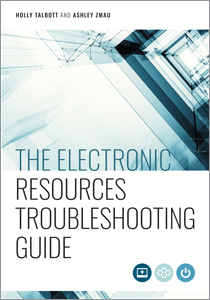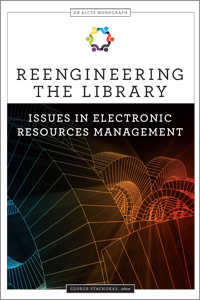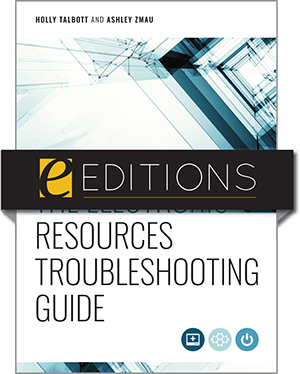Review Collaborative Electronic Resource Managemtnt From Acquisitions to Assessment

Techniques for Electronic Resource Management: TERMS and the Transition to Open
Save 50% off this title! Take advantage of this limited time offering; adept while supplies last. Valid for online orders at alastore.ala.org. May not be combined with ALA Member discount or returned.
Samples
- Clarification
- Tabular array of Contents
- Nearly the Authors
- Reviews
Growing Open Access (OA) options, Big Deal price pressure, fluid east-book purchasing models, and the demand for ongoing assessment: it all adds upward to a lot of moving parts. More e'er, y'all need a businesslike framework for managing the many details of your online materials. TERMS—Techniques for Electronic Resource Management Systems—gave you one. Now its creators, incorporating five years of notes and input from many voices in the field, take updated their influential lifecycle model. In half dozen sections you lot will circle through selection, procurement and licensing, implementation, troubleshooting, evaluation, and preservation and sustainability. Offering targeted guidance on both basic and circuitous issues, this book'southward topics include
- ways to fold OA direction into traditional library practise;
- accommodating the range of new purchasing models;
- the relative weight of 13 factors when negotiating with vendors;
- understanding deal-breakers and knowing when to walk abroad;
- cess after COUNTER 5 and bibliometrics;
- criteria for making decisions on preservation and sustainability;
- managing streaming media; and
- six major developments to watch every bit the field evolves.
Whether a single team manages electronic resource or responsibility is spread across your library, this book will be your go-to ERM reference.
Listing of Illustrations
Acknowledgments
one. What'due south New with TERMS
Influence of TERMs
Intention
Structural Updates
Audience
Pattern
Notes
two. Investigating New Content for Purchase and Improver
Introduction
1. Asking
2. Developing Selection Criteria
three. Completing the Review Form
4. Analyzing and Reviewing
five. Establishing a Trial and Contacting Vendors
half dozen. Making a Decision
Notes
three. Purchasing and Licensing
Introduction
one. Establishing Negotiation Criteria
two. Common Points of Negotiation in License Agreements
3. License Review and Signature
4. Negotiating and Renegotiating Contracts
5. Working with Other Departments and Areas on Resource Contracts
6. Recording Administrative Metadata
Notes
four. Implementation
Introduction
i. Access
2. Descriptive Metadata Direction
3. Administrative Portals and Metadata
iv. Subject Portals, Reading Lists Direction Systems, Courseware, and Local Digital Collections Discovery
5. Testing Access
6. Branding and Marketing
Notes
5. Troubleshooting
Introduction
1. A Systematic Approach to Troubleshooting
two. Common Problems
3.Metadata
four.Tools for Troubleshooting
5. Communication in Troubleshooting
6. Negative Affect of Finish Users Giving Upwards
Notes
vi. Cess
Introduction
ane. Performance of the Resource confronting the Selection Criteria and Troubleshooting Feedback
ii. Usage Statistics
3. Price per Download
iv. Non-Traditional Bibliometrics
five. Consultation
6. Counterfoil Review
Notes
7. Preservation and Sustainability
Introduction
i. Choosing What to Preserve and Sustain
2. Developing Preservation and Sustainability Plans
3. Metadata Needed for Preservation
4. Local Preservation Options (Servers, Media Drives, LOCKSS/CLOCKSS, MetaArchive)
v. Cloud-Based Options (Archive-It, Portico, Media Portals, DPLA Hubs, Shared Preservation Structure)
6. Exit Strategy
Notes
8. Conclusion
The Adjacent Major Drove Topic: Data and Other Scholarly Outputs
The Next Major Procurement and Licensing Topic: Significant OA Growth
The Next Major Implementation Topics: Knowledge Bases and Persistent Identifiers
The Next Major Cess Topics: COUNTER Release 5 and Book Data Enhancements
The Side by side Major Troubleshooting Topic: Web Browser Plug-ins
The Next Major Preservation Topic: Preservation of Not-Traditional Scholarly Outputs
Open Admission as a Existent Alternative?
Notes
Glossary
Virtually the Authors
Index
"Brings a lot of detailed data together into a useful framework, and is written clearly plenty to exist useful to experts, while still digestible to the uninitiated. For technical services librarians direct involved in the management of electronic resource, it should exist required reading. Librarians in adjacent disciplines such as cataloging, acquisitions, and preservation also will observe this work helpful, because it traces the many means in which these resources bear upon every aspect of library technical services work."
—Technicalities
"This detailed handling of the process of managing electronic resources in libraries is required reading for librarians who purchase or back up electronic resource."
—CHOICE
"The technical substance of this volume makes information technology almost required reading for librarians to keep upward to appointment with the current thinking on administrative librarianship."
— Catholic Library Globe
Likewise of Involvement:

Fundamentals of Electronic Resources Management

We Are Water Protectors Bookmark

The Electronic Resources Troubleshooting Guide

Affordable Course Materials: Electronic Textbooks and Open Educational Resources

Reengineering the Library: Issues in Electronic Resources Direction

The Electronic Resource Troubleshooting Guide—eEditions due east-book

Planning and Implementing Electronic Records Management: A Practical Guide

Museum Collections Management: A Handbook
Source: https://alastore.ala.org/content/techniques-electronic-resource-management-terms-and-transition-open